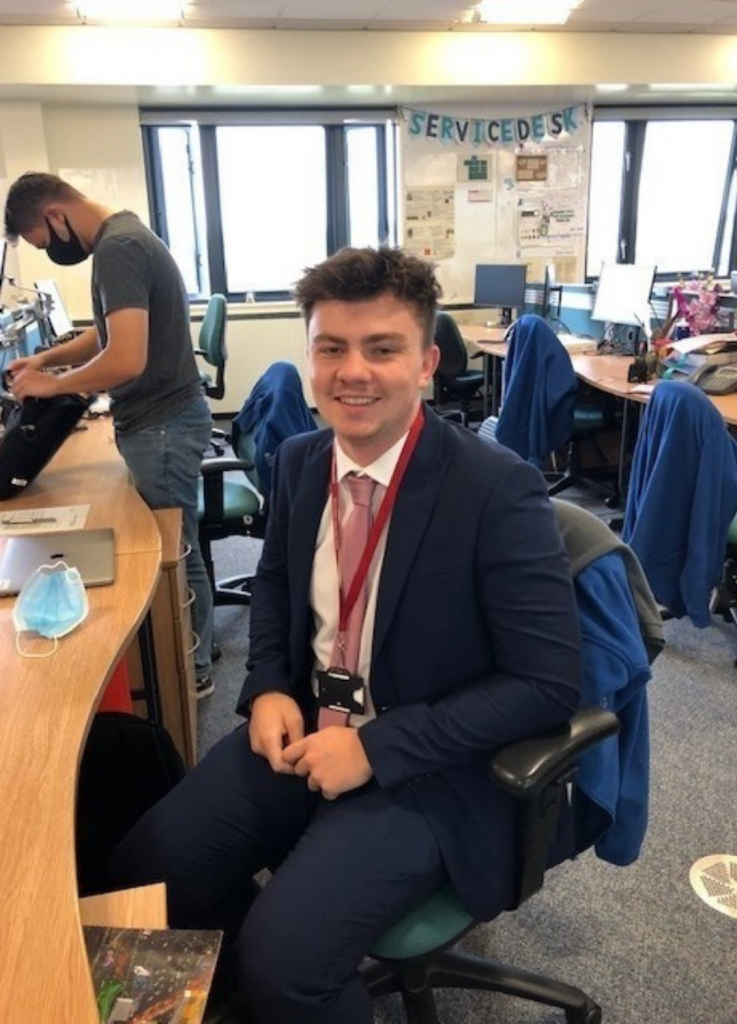Our aim at DVLA is to be a Centre of Digital Excellence and the best place to start or continue a career in digital. One of the ways we’re achieving this is through our talent pipeline development programmes. They include a unique opportunity to undertake the academic training required to complete an MSc degree in software engineering over 24 months, alongside on-the-job training at DVLA.
Two of our MSc students, Riley Croucher and Harley-Earl Burrow, are preparing to start their projects in time for the second year of the programme. We caught up with them to ask about how the course has shaped up so far and what their projects will entail.
Tell us a bit about yourself:
Riley
My name is Riley Croucher and I’m one of the MSc students in the current cohort. I started at the DVLA last September after completing my degree at Cardiff University. Since joining, I have been immersed in the life of software development both at university during my MSc studies and as a software dev for the Flying Spartans’ squad.
Harley
I’m Harley-Earl Burrow, I’m 27 and live in Swansea. I grew up in Llanelli/Carmarthen/Evesham and studied psychology as an undergraduate in Cardiff Metropolitan University. Before the DVLA, I worked in PRA Health Sciences, a clinical research organisation, as a Site Intelligence Specialist. I have always been interested in computers and have built a few, but I’m quite new to the world of programming and software engineering. Prior to this course I had only a basic understanding of some concepts I had picked up in my free time for passion projects.


How have you found your first year of the programme?
Riley
I have found it enjoyable and challenging, but I have enjoyed the challenges I’ve been presented with!
Harley
I have found the first year of the programme to be a really helpful step between leaving university and starting a future career. This step has highlighted the progression between starting the programme with a limited knowledge on software development to now being a developer within a squad.
What have you enjoyed the most?
Riley
The most enjoyable part so far was the assessment week, where we were tasked as groups with programming a text-based Role Playing Game (RPG) in Java. That was a lot of fun and I continue to work on similar projects in my free time for fun.
Harley
The whole year itself has been exciting and enjoyable. In particular, I have enjoyed the blended approach between university and working within my squad.
What did you learn?
Riley
I’ve learnt a wide range of topics, from the Agile methodology of working in software engineering, to database systems and Object Oriented Programming (OOP). All have been enjoyable and interesting, though OOP is my favourite, due to its ability to create interesting programmes.
Harley
In university I’ve learned topics such as Java, Agile and OOP. I have then been able to apply them to real world situations within the squad.
What is the next step of the programme?
Riley
The next step is completing our major project, a research focused masters dissertation.
Harley
In the final year of the programme, time is split between further integrating into our squads and designing and producing a masters project. Currently, I am writing my project proposal which details what I intend to achieve within the next year and also the relevance my project has towards the DVLA.
Talk us through your project topic
Riley
My project topic is to use handwriting recognition in machine learning to read a form document. During my literature review I’ve found a handful of similar projects exploring this area and I think its application to DVLA forms and documents would be interesting to explore, specifically, the practicality and possible benefits of its use cases.
Harley
My drafted idea is to design a machine learning model which will be able to detect fatigue in real-time, and built using Amazon Web Services (AWS) which is an area of software I have a previous interest in.
How did you decide on your topic?
Riley
We were provided with several rough topic ideas that both the university lecturers and DVLA course leaders had suggested we could explore. The initial idea was computer vision for handwriting recognition. Machine learning, neural networks and computer vision fascinated me, so I decided to conduct some research into the area. I wanted to somehow relate this to the DVLA and wondered if using computer vision to read a form submitted to the DVLA would be viable, so I spoke to a university lecturer to further refine my idea.
Harley
I decided on designing a machine learning model as the time I have spent on my team has highlighted the importance of serverless technologies.
What are the business benefits?
Riley
I believe there is the possibility to increase efficiency with processing forms completed by hand and sent to the DVLA. Although more services are becoming available online, there will likely always be a population of people who prefer to complete a form by hand and send it by post. Rather than people reading forms by hand one by one, it could be possible for a programme to process forms much quicker. Additionally, in a future release, this could be deployed onto an app where customers could scan the form with their phones. This would save people having to send the forms by post, thus making the process more efficient.
Harley
I wanted to explore the capabilities of AWS in handling a machine learning project. When trying to find potential subject matters, I found research from The Royal Society for the Prevention of Accidents, which stated driver fatigue may be a contributory factor in up to 20% of car accidents and this type of accident is 50% more likely to result in fatality or serious injury. This was quite a startling statistic to me and is the main reason for my drafted project idea.
What do you hope to achieve at the end?
Riley
I hope to be able to have a working programme that can scan DVLA forms with various styles of handwriting (as some people, like myself, have very messy handwriting), and then complete these forms in the programme in place. I’m hoping to achieve a high accuracy with as a low a margin of error as possible. I will then look into how efficient (if at all) this process is and if it has any benefits or further applications!
Harley
My hope is to design an AWS application which will be able to score a person’s fatigue using an AWS DeepLens camera, and then alert them if they are showing signs of strong fatigue which inhibit their driving capabilities.
If you think you’d enjoy being involved in projects like this, and you’re interested in what it’s like to work at DVLA Digital, then check out our latest vacancies on Civil Service Jobs.




